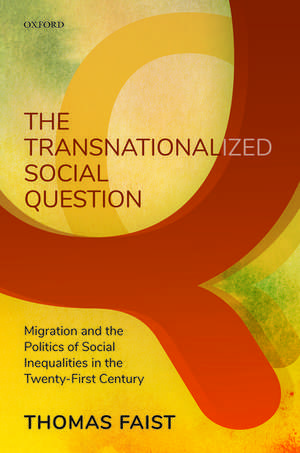The Transnationalized Social Question: Migration and the Politics of Social Inequalities in the Twenty-First Century
Autor Thomas Faisten Limba Engleză Hardback – 28 dec 2018
Preț: 631.73 lei
Preț vechi: 903.37 lei
-30% Nou
Puncte Express: 948
Preț estimativ în valută:
120.88€ • 131.72$ • 101.86£
120.88€ • 131.72$ • 101.86£
Carte tipărită la comandă
Livrare economică 12-18 aprilie
Preluare comenzi: 021 569.72.76
Specificații
ISBN-13: 9780199249015
ISBN-10: 0199249016
Pagini: 390
Dimensiuni: 164 x 241 x 29 mm
Greutate: 0.75 kg
Editura: OUP OXFORD
Colecția OUP Oxford
Locul publicării:Oxford, United Kingdom
ISBN-10: 0199249016
Pagini: 390
Dimensiuni: 164 x 241 x 29 mm
Greutate: 0.75 kg
Editura: OUP OXFORD
Colecția OUP Oxford
Locul publicării:Oxford, United Kingdom
Recenzii
The transnationalized social question is a remarkable and very original book, analyzing migration movements between the Global South and the Global North from the point of view of social gaps. Exit, as a response to global inequalities, takes place in a world where social inequalities between countries are stronger than inequalities inside the countries. Cross border migration is a crucial field for understanding social inequalities in the context of transnationalization of labour and global asymmetries. The choice of Thomas Faist to explore the whole migration complex through the transnational approach of social questions is a brilliant renewal of research. The final claim towards researchers to engage in the public sphere is an urgent request when decision makers have difficultly agreeing with them on the solutions.
Thomas Faist has provided a brilliant and valuable reflection on several issues of the current debates in social sciences with this book: not only migration as an increasing selective form of human mobility, but also social inequalities, North-South relations on a global scale, transnational social protection, the environmental issues. Faist, among several other relevant topics, addresses convincingly the crucial role of location and borders for social inequalities, the rising cultural conflicts beyond socio-economic cleavages, the design of internal boundaries as forms of domination and exclusion. This book will remain a cornerstone of the intellectual debate on the relationship between international migrations and the main social issues of our time, and I hope it will become an essential guide for the new generation of social scientists.
Thomas Faist has provided a brilliant and valuable reflection on several issues of the current debates in social sciences with this book: not only migration as an increasing selective form of human mobility, but also social inequalities, North-South relations on a global scale, transnational social protection, the environmental issues. Faist, among several other relevant topics, addresses convincingly the crucial role of location and borders for social inequalities, the rising cultural conflicts beyond socio-economic cleavages, the design of internal boundaries as forms of domination and exclusion. This book will remain a cornerstone of the intellectual debate on the relationship between international migrations and the main social issues of our time, and I hope it will become an essential guide for the new generation of social scientists.
Notă biografică
Thomas Faist is Professor of Sociology at Bielefeld University. His fields of interest are transnational relations, cross-border migration, citizenship, and social policy. His previous publications include Dynamics of International Migration and Transnational Social Spaces (2000), Dual Citizenship in Europe (2007), Beyond a Border: The Causes and Consequences of Contemporary Immigration (with Peter Kivisto, 2010), Diaspora and Transnationalism: Concepts, Theories and Methods (with Rainer Bauböck, 2010), and Environmental Migration and Social Inequalities (with Robert McLehman and Jeanette Schade, 2016).
